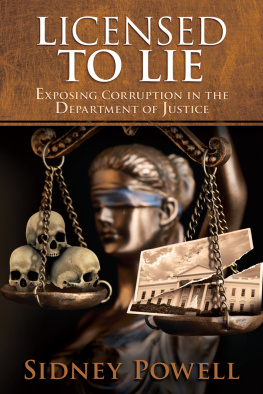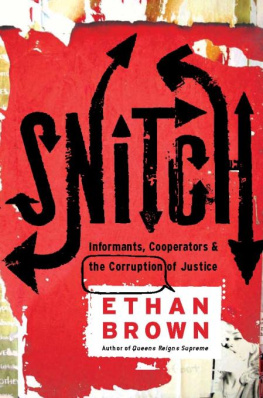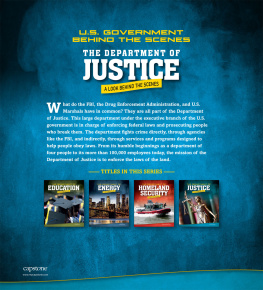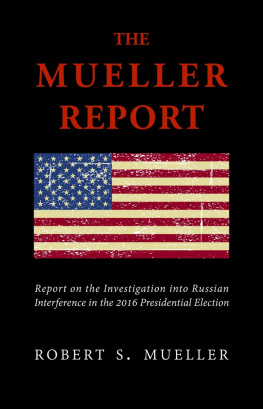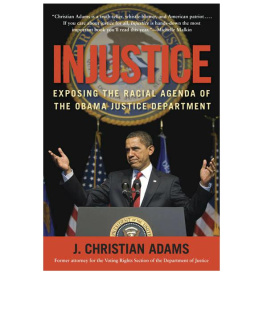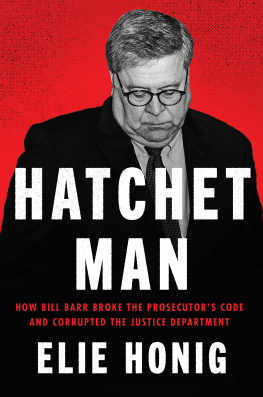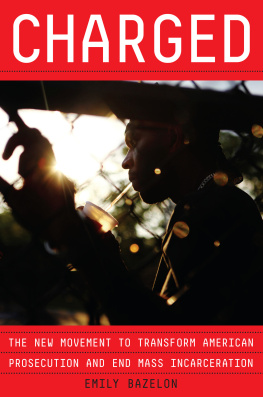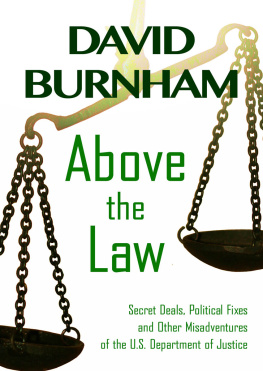All rights reserved. No part of this book may be used or reproduced in any manner without written permission except in the case of brief quotations embodied in critical articles or reviews.
To all those who seek, hallow, and do Justice.
Foreword
W e Americans are extremely proud of our criminal justice system. We believe it to be the best and fairest in the world. And in many ways it is. We guarantee every criminal defendant an impartial judge, a fair jury and a defense lawyerat public expense for the many who cant afford one. The prosecution must prove guilt beyond a reasonable doubt, and must do so in a speedy, public trial. And we have a variety of rules governing the collection and presentation of evidence, all designed to ensure that justice is done in every case. But the system only works if the participants follow the rules.
Prosecutors have a particularly strong duty to act fairly because, as the Supreme Court has explained, they are the representatives not of an ordinary party to a controversy, but of a sovereignty whose obligation to govern impartially is as compelling as its obligation to govern at all; and whose interest, therefore, in a criminal prosecution is not that it shall win a case, but that justice shall be done. In the words of fabled defense lawyer Brendan Sullivan, [i]f the government is not honest, it can trump even the best efforts of those of us who work in the system.
Sullivan uttered those words in the case against former Senator Ted Stevens, who was convicted after federal prosecutors concealed evidence favorable to the defense and lied about it in court. The conviction was vacated once the governments deception was revealed, but this occurred long after Stevens had lost an electionending a 40-year Senate career and changing the balance of power in the Senateas a direct result of the wrongful conviction.
The Stevens case is just one of several high-profile criminal prosecutions engineered by a small cadre of high-ranking United States Department of Justice lawyers. Most of the convictions obtained by the government have been set aside, but not before wasting countless millions of taxpayer dollars and wreaking havoc on the lives and businesses of those charged with federal crimes. The venerable accounting firm of Arthur Andersen was destroyed by a prosecutorial decision to charge the firm, not merely individual partners, with criminal conduct. While the Supreme Court eventually held that the crime of which Andersen was convicted was no crime at allin other words, that Andersen had acted lawfullythe exoneration came too late to save the business or the 85,000 jobs it provided in its various offices world-wide. Other defendants were exonerated after spending time behind bars for conduct that turned out to be entirely lawful.
The Center for Prosecutor Integrity lists the following as some of the most serious types of prosecutorial misconduct:
- Charging a suspect with more offenses than is warranted
- Withholding or delaying the release of exculpatory evidence
- Deliberately mishandling, mistreating, or destroying evidence
- Allowing witnesses they know or should know are not truthful to testify
- Pressuring defense witnesses not to testify
- Relying on fraudulent forensic experts
- During plea negotiations, overstating the strength of the evidence
- Making statements to the media that are designed to arouse public indignation
- Making improper or misleading statements to the jury
- Failing to report prosecutor misconduct when it is discovered.
And why do prosecutors engage in misconduct? The Center provides an answer:
Prosecutors are subjected to a variety of powerful incentives that serve to reward zealous advocacy: the gratitude of victims, favorable media coverage, career promotions, appointment to judgeships, and the allure of high political office.
Much of this behavior is illustrated in the pages of this book, and requires no elaboration. However, two items on the Center for Prosecutor Integritys list merit a few additional words, as their significance may not be immediately apparent to readers unfamiliar with the criminal justice process.
The first is the growing practice of over-charging, particularly with crimes of dubious validity. One of the bedrock principles of our criminal law is that citizens are entitled to fair notice of what is criminal and what is legal. People can then avoid prosecution by engaging in lawful activities. The right to do what the law does not prohibit, without fear of harassment or punishment, is one of the hallmarks of a free society. One of the fundamental responsibilities of a prosecutor is to charge defendants only with conduct that is clearly criminal. And yet, time and again in these high-profile prosecutions, the United States Department of Justice charged multiple defendants with crimes that simply werent crimes. In addition to the so-called crime that destroyed Arthur Andersen, the Supreme Court held in rapid succession that the government had obtained convictions in three other cases where the charged conduct wasnt criminal. Nevertheless, the government insistedand the judges supinely agreedthat the defendants must start serving their time behind bars even as their challenges to their convictions upon these alleged violations were being considered on appeal.
Another important responsibility of prosecutors is to disclose to the defense any exculpatory information of which the government is aware. The Supreme Court announced this as a constitutional requirement in the 1963 case of Brady v. Maryland, and it has confirmed its underlying principles many times since. It may not be obvious to the lay reader why the government must provide the defendant with evidence that may undermine the prosecution, so its worth a brief explanation. Most fundamental is the fact that the government is not an ordinary litigant whose interest lies in winning at all costs. Rather, the governments legitimate interest lies in convicting only those defendants who are proven guilty beyond a reasonable doubt. If the government has evidence that casts doubt on the defendants guilt, it has every interest in producing that evidence for the jury to consider in reaching its decision. As the Supreme Court noted in Brady, [a]n inscription on the walls of the Department of Justice states the proposition candidly for the federal domain: The United States wins its point whenever justice is done its citizens in the courts.
Beyond this theoretical justification are important practical reasons for the Brady rule: Government agents usually have unimpeded and exclusive access to the crime scene, so they can easily remove and conceal evidence that might contradict the prosecutions case. Police also generally talk to witnesses first and can pressure them to change their story to conform to the prosecutions theory of the case. Prosecutors can, and often do, threaten to charge witnesses as accomplices or co-conspirators if they testify favorably to the defense. As a result, potential exculpatory witnesses invoke the Fifth Amendment to avoid getting themselves into trouble. The government has virtually unhampered control over forensic evidence, as well as its analysis and presentation by experts. Too often these experts turn out to be sloppy or dishonest; many defendants have spent long years behind bars because of incompetent or corrupt forensic scientists employed by law enforcement. Many of those convictions could have been avoided if the jury had been shown the evidence casting doubt on the validity of the expert reports.

